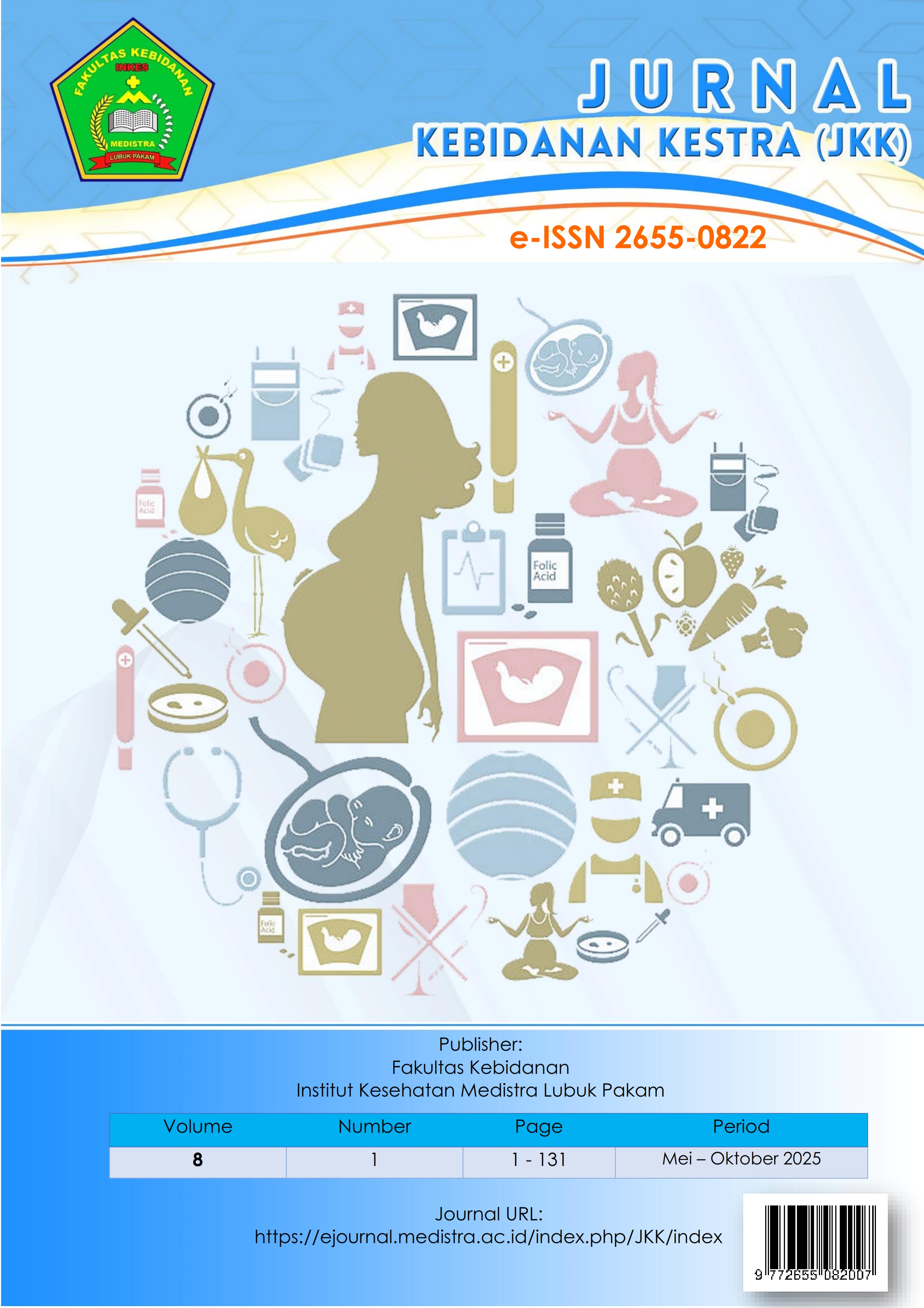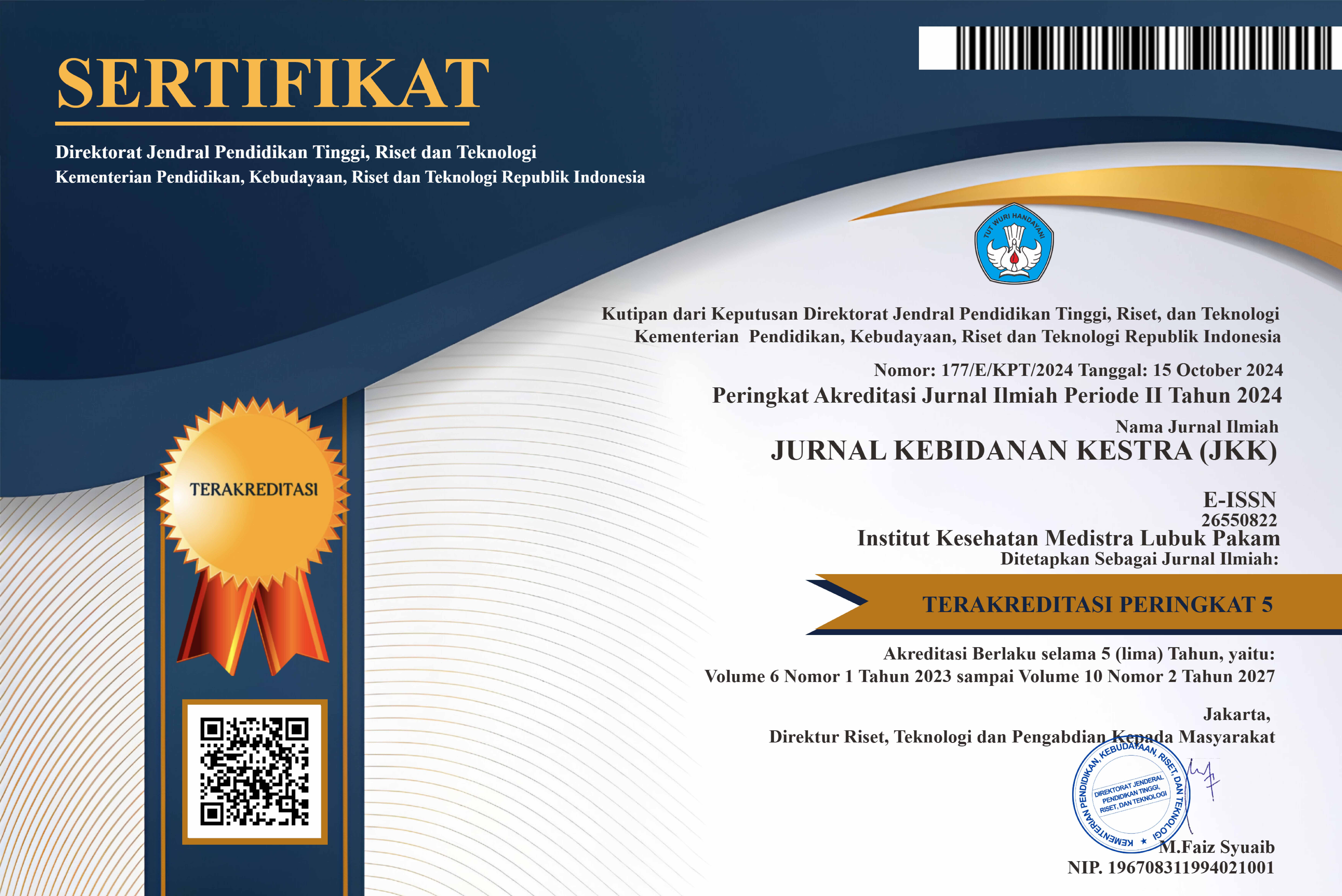The Level of Student Knowledge about Reproductive Health at the Faculty of Midwifery, Medistra Lubuk Pakam
DOI:
https://doi.org/10.35451/0vgsm035Keywords:
Reproductive Health; Midwifery Students; Knowledge.Abstract
Reproductive health is a fundamental competency that must be mastered by midwifery students because it is closely related to professional practice in maternal and child health services. This study aims to analyze determine the level of knowledge of students of the Faculty of Midwifery at the Medistra Health Institute, Lubuk Pakam, regarding reproductive health. The study design used a quantitative descriptive approach with a cross-sectional method. The study sample consisted of 100 students selected using a purposive sampling technique. Data were collected using a structured questionnaire and analyzed using SPSS software with descriptive statistical tests and Pearson correlation. The results showed that 72% of students had a good level of knowledge, 20% had a sufficient level of knowledge, and 8% had a poor level of knowledge. The correlation analysis showed a positive relationship between knowledge level and semester (r = 0.416; p < 0.05), meaning that the higher the semester, the better the level of knowledge. The conclusion of this study indicates that the level of student knowledge about reproductive health is quite good, but it is necessary to improve continuous education through contextual learning and field-based training.
Downloads
References
[1] BKKBN. (2022). Laporan Tahunan Kesehatan Reproduksi Nasional 2022. Jakarta: BKKBN.
[2] Budiarti, S. (2022). Kesiapan mahasiswa kebidanan dalam edukasi kesehatan reproduksi. Jurnal Midwifery Educ, 6(2), 210–219.
[3] Bloom, B. S. (1956). Taxonomy of Educational Objectives: The Classification of Educational Goals. New York: Longmans, Green and Co.
[4] Green, L. W., & Kreuter, M. W. (2005). Health Program Planning: An Educational and Ecological Approach (4th ed.). New York: McGraw-Hill.
[5] Khalil, N., et al. (2021). Knowledge and attitude toward reproductive health among university students. BMC Public Health, 21(1), 1523.
[6] Marbun, R. A. (2021). Pendidikan reproduksi dan perilaku preventif mahasiswa. Jurnal Bios Logos, 11(1), 1–6.
[7] Notoatmodjo, S. (2012). Pendidikan dan Perilaku Kesehatan. Jakarta: Rineka Cipta.
[8] Nugraha, D., & Hartati, L. (2024). Determinan pengetahuan kesehatan reproduksi. Jurnal Kesehatan Masyarakat, 9(1), 21–30.
[9] Nurhidayah, N., Rahmawati, E., & Lestari, D. (2021). Tingkat pengetahuan mahasiswa kebidanan tentang kesehatan reproduksi remaja. Jurnal Kebidanan dan Kesehatan, 12(2), 45–52.
[10] Oktaviani, R., & Sari, L. (2023). Pengetahuan kesehatan reproduksi dan perilaku mahasiswa kebidanan. Jurnal Midwifery Studies, 9(3), 112–118.
[11] Prawirohardjo, S. (2021). Ilmu Kebidanan. Jakarta: Yayasan Bina Pustaka.
[12] Pratiwi, E., & Sulastri, N. (2024). Faktor sosial dan budaya dalam pemahaman kesehatan reproduksi. Jurnal Kesmas Indonesia, 12(1), 55–63.
[13] Putri, Y., Mulyani, A., & Dewi, R. (2021). Pengetahuan kesehatan reproduksi di kalangan remaja perempuan. Jurnal Kesehatan Reproduksi Indonesia, 8(2), 130–137.
[14] Rahman, F., Arifin, M., & Wulandari, S. (2023). Hubungan tingkat pendidikan dan pengetahuan kesehatan reproduksi pada mahasiswa kesehatan. BMC Women’s Health, 23(7), 105–113.
[15] Salim, M., & Noor, F. (2023). Pengaruh sosialisasi kesehatan reproduksi terhadap pengetahuan mahasiswa. Jurnal Kesehatan Nasional, 10(3), 198–206.
[16] S. Widodo dan M. Handayani, “Peran faktor predisposisi, pemungkin, dan penguat terhadap perilaku kesehatan reproduksi mahasiswa,” Jurnal Promosi Kesehatan Indonesia, vol. 18, no. 1, pp. 45–54, 2022.
[17] M. Wahyuni, “Implementasi problem-based learning pada pendidikan kebidanan,” Jurnal Keperawatan dan Kebidanan, vol. 10, no. 2, pp. 87–95, 2022.
[18] S. Kurniasih, “Kolaborasi institusi pendidikan dan masyarakat dalam peningkatan literasi kesehatan reproduksi,” Jurnal Pengabdian Masyarakat Kesehatan, vol. 5, no. 1, pp. 21–28, 2023.
[19] Kementerian Kesehatan RI, Rencana Aksi Nasional Kesehatan Ibu dan Anak 2020–2024. Jakarta: Kemenkes RI, 2020.
[20] United Nations, Sustainable Development Goals: Goal 3 and 5. New York: United Nations, 2015.
[21] E. Yusuf dan N. Apriani, “Peran bidan dalam promosi kesehatan reproduksi remaja,” Jurnal Ilmu Kebidanan Indonesia, vol. 7, no. 1, pp. 56–63, 2023.
Downloads
Published
Issue
Section
License
Copyright (c) 2025 Fiyola Ladyvia, Natasha Elga Haryono, Ismah Khaerunisa

This work is licensed under a Creative Commons Attribution 4.0 International License.
Copyright in each article is the property of the Author.



























